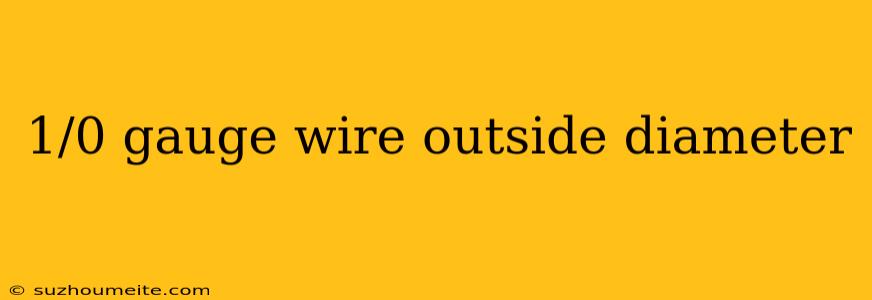1/0 Gauge Wire Outside Diameter: Understanding the Specifications
When it comes to electrical wiring, the gauge of the wire is a critical factor in determining its current-carrying capacity and resistance. One of the most commonly used wire gauges is 1/0, which is often referred to as "one ought" gauge. But what is the outside diameter of a 1/0 gauge wire?
What is AWG?
Before we dive into the outside diameter of 1/0 gauge wire, let's quickly explain what AWG stands for. AWG, or American Wire Gauge, is a standard system for measuring the diameter of electrical wires. The AWG system is used to classify wires based on their cross-sectional area, which determines their current-carrying capacity.
Outside Diameter of 1/0 Gauge Wire
According to the AWG standard, a 1/0 gauge wire has an outside diameter of approximately 0.325 inches or 8.25 mm. This diameter is the result of the wire's cross-sectional area, which is specified as 53.49 mm².
Comparison with Other Gauges
To put this into perspective, here's a comparison of the outside diameters of different wire gauges:
| Gauge | Outside Diameter (inches) | Outside Diameter (mm) |
|---|---|---|
| 1/0 | 0.325 | 8.25 |
| 2/0 | 0.365 | 9.27 |
| 3/0 | 0.410 | 10.41 |
| 4/0 | 0.460 | 11.68 |
Applications of 1/0 Gauge Wire
The 1/0 gauge wire is commonly used in a variety of applications, including:
- Electrical power distribution: 1/0 gauge wire is often used in electrical power distribution systems, such as residential and commercial wiring.
- Automotive: 1/0 gauge wire is used in automotive applications, such as starter motor wiring and battery cables.
- Industrial: 1/0 gauge wire is used in industrial applications, such as powering motors and machinery.
Conclusion
In conclusion, the outside diameter of a 1/0 gauge wire is approximately 0.325 inches or 8.25 mm. Understanding the specifications of wire gauges is crucial in selecting the right wire for your electrical projects. Remember to always follow safety guidelines and consult with a licensed electrician if you're unsure about wire sizing or installation.
